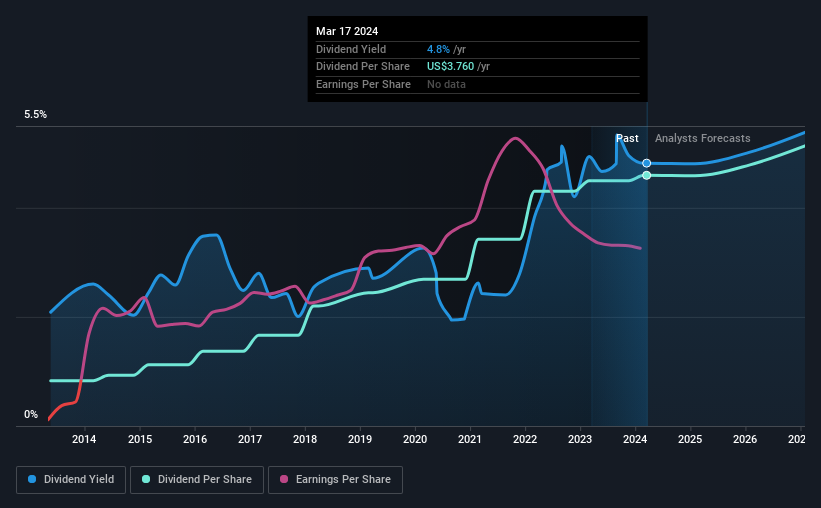Best Buy (NYSE:BBY) Is Increasing Its Dividend To $0.94
Best Buy Co., Inc. (NYSE:BBY) has announced that it will be increasing its dividend from last year's comparable payment on the 11th of April to $0.94. This takes the dividend yield to 4.8%, which shareholders will be pleased with.
Check out our latest analysis for Best Buy
Best Buy's Earnings Easily Cover The Distributions
While it is great to have a strong dividend yield, we should also consider whether the payment is sustainable. The last payment was quite easily covered by earnings, but it made up 120% of cash flows. The company might be more focused on returning cash to shareholders, but paying out this much of its cash flow could expose the dividend to being cut in the future.
The next year is set to see EPS grow by 30.7%. If the dividend continues along recent trends, we estimate the payout ratio will be 57%, which is in the range that makes us comfortable with the sustainability of the dividend.
Best Buy Has A Solid Track Record
The company has a sustained record of paying dividends with very little fluctuation. Since 2014, the dividend has gone from $0.68 total annually to $3.76. This works out to be a compound annual growth rate (CAGR) of approximately 19% a year over that time. It is good to see that there has been strong dividend growth, and that there haven't been any cuts for a long time.
The Dividend's Growth Prospects Are Limited
The company's investors will be pleased to have been receiving dividend income for some time. Unfortunately, Best Buy's earnings per share has been essentially flat over the past five years, which means the dividend may not be increased each year. Best Buy is struggling to find viable investments, so it is returning more to shareholders. This isn't necessarily bad, but we wouldn't expect rapid dividend growth in the future.
Our Thoughts On Best Buy's Dividend
Overall, we always like to see the dividend being raised, but we don't think Best Buy will make a great income stock. With cash flows lacking, it is difficult to see how the company can sustain a dividend payment. We would probably look elsewhere for an income investment.
It's important to note that companies having a consistent dividend policy will generate greater investor confidence than those having an erratic one. Still, investors need to consider a host of other factors, apart from dividend payments, when analysing a company. Just as an example, we've come across 3 warning signs for Best Buy you should be aware of, and 1 of them is concerning. If you are a dividend investor, you might also want to look at our curated list of high yield dividend stocks.
Have feedback on this article? Concerned about the content? Get in touch with us directly. Alternatively, email editorial-team (at) simplywallst.com.
This article by Simply Wall St is general in nature. We provide commentary based on historical data and analyst forecasts only using an unbiased methodology and our articles are not intended to be financial advice. It does not constitute a recommendation to buy or sell any stock, and does not take account of your objectives, or your financial situation. We aim to bring you long-term focused analysis driven by fundamental data. Note that our analysis may not factor in the latest price-sensitive company announcements or qualitative material. Simply Wall St has no position in any stocks mentioned.

